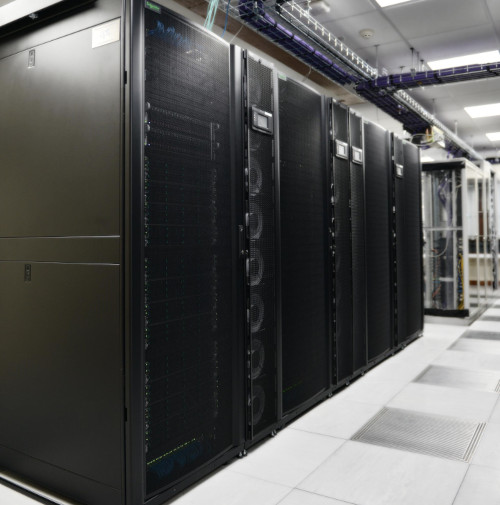Difference between revisions of "Main Page"
(responsive causing a few issues - fix inbound) |
(added support links and headings) |
||
| Line 2: | Line 2: | ||
Viper is the University of Hull's supercomputer and is located on-site with its own dedicated team to administrate it and develop applications upon it. | Viper is the University of Hull's supercomputer and is located on-site with its own dedicated team to administrate it and develop applications upon it. | ||
[[ File:CroppedHPC-01.jpg |center]] | [[ File:CroppedHPC-01.jpg |center]] | ||
| + | '''What is a Supercomputer?''' | ||
| + | |||
A supercomputer is a computer with a high level of computing performance compared to a general-purpose computer. It achieves this level of performance by allowing the user to split a large job into smaller computation tasks which then run in parallel, or by running a single task with many different scenarios on the data across parallel processing units. | A supercomputer is a computer with a high level of computing performance compared to a general-purpose computer. It achieves this level of performance by allowing the user to split a large job into smaller computation tasks which then run in parallel, or by running a single task with many different scenarios on the data across parallel processing units. | ||
| + | |||
| + | '''What are Supercomputers used for?''' | ||
Supercomputers generally aim for the maximum in capability computing. Capability computing is typically thought of as using the maximum computing power to solve a single large problem in the shortest amount of time. Often a capability system is able to solve a problem of a size or complexity that no other computer can, e.g., a very complex weather simulation application. | Supercomputers generally aim for the maximum in capability computing. Capability computing is typically thought of as using the maximum computing power to solve a single large problem in the shortest amount of time. Often a capability system is able to solve a problem of a size or complexity that no other computer can, e.g., a very complex weather simulation application. | ||
| Line 28: | Line 32: | ||
[[Training/Tutorial Videos|Tutorial Videos]] | [[Training/Tutorial Videos|Tutorial Videos]] | ||
| + | |||
| + | ==Support== | ||
| + | [[General/UserDropin|User Drop-in Sessions]] | ||
| + | |||
| + | [[Training/Tutorial Videos|Tutorial Videos]] | ||
| + | |||
| + | [https://support.hull.ac.uk/tas/public/ssp/content/detail/service?unid=aa2960ac94de4552943cca8898c10fac| Get VPN Access] | ||
| + | |||
| + | [https://support.hull.ac.uk/tas/public/ssp/content/detail/service?unid=04cebf66128e4c8c8df023229c23b64a&from=fc9f9490-9a29-40fa-9bf2-5b969f87fa1a| Support Portal] | ||
==Further Topics== | ==Further Topics== | ||
Revision as of 15:42, 26 October 2022
Welcome To Viper!
Viper is the University of Hull's supercomputer and is located on-site with its own dedicated team to administrate it and develop applications upon it.
What is a Supercomputer?
A supercomputer is a computer with a high level of computing performance compared to a general-purpose computer. It achieves this level of performance by allowing the user to split a large job into smaller computation tasks which then run in parallel, or by running a single task with many different scenarios on the data across parallel processing units.
What are Supercomputers used for?
Supercomputers generally aim for the maximum in capability computing. Capability computing is typically thought of as using the maximum computing power to solve a single large problem in the shortest amount of time. Often a capability system is able to solve a problem of a size or complexity that no other computer can, e.g., a very complex weather simulation application.
New Users
New to Viper? Here is a step by step guide to help you run your first job.
Apply for an account (campus only)
Support
Further Topics
Additional information on more specific topics.

